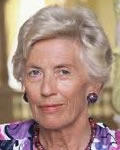
Francisca Nolthenius Helene, Helene Nolthenius pen name, known as University Professor Helene-Nolthenius Wagenaar, Amsterdam, April 9, 1920 - there, April 22, 2000, was a Dutch writer, cultural historian and musicologist._x000D_
Nolthenius studied musicology at Utrecht University. It thus set a family tradition. Both father and grandfather were classical scholar and musician. In 1941 she founded together with Nancy van der Elst Study on Hucbald. Van der Elst composed several works on texts by Nolthenius, including the - still used by the association - Hucbald-'motet._x000D_
From a strong social conscience she joined some time with the CPN. She was also a time professed Catholic. In 1945 doctoral Nolthenius did._x000D_
She began her career by writing music reviews for the Catholic newspaper The Maasbode. She became in 1946 Head of the Music Department of the Catholic Radio Broadcast (KRO). In 1948 she obtained her PhD at Albert Smijers a dissertation on the ancient melody of Italy: the music of the duecento._x000D_
Early fifties published her first literary and scientific books which they became famous. In the seventies and eighties she published crime novels they sited in medieval Italy._x000D_
In 1958 Nolthenius associate professor of music from antiquity and the Middle Ages at the University of Utrecht. In 1966 she was converted into an ordinary chair professorship. In 1974 she was appointed member of the Royal Dutch Academy of Sciences (KNAW). Since the nineties, it is considered an important pioneer in the new historiography, especially the history of mentalities._x000D_
As erudite scholar Nolthenius was right for the preservation of humanities at the university. She suffered much under the general decline in the level of development of students. This resulted from a series of budget cuts in the sixties and seventies. She was a beloved teacher, though she could seem unapproachable in her lectures and her exams were feared. Hélène Nolthenius was very impressed with Francis of Assisi, even distanced themselves from Catholicism, and she opted for the reason above faith. Events of the war had a lasting influence on her life._x000D_
Nolthenius became known to a large audience by her Renaissance often reprinted books in May and duecento. Her studies on Gregorian chant, music between heaven and earth, and a biography of Francis of Assisi, a man from the valley of Spoleto. Her book on Gregorian experienced in 2009, third edition.




